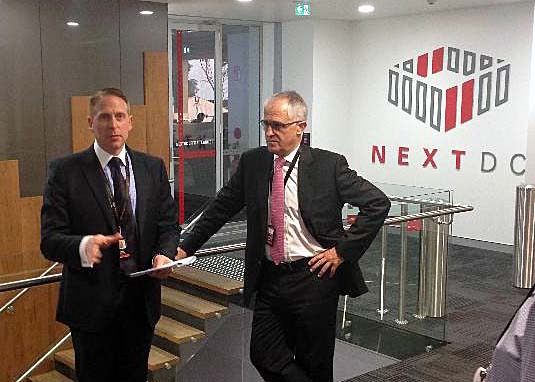Turnbull 'reasonably confident' of new anti-piracy scheme

Despite years of disagreements and tensions between internet service providers and rights holders in Australia, Communications Minister Malcolm Turnbull has said he is confident that they will work together to develop a scheme to crack down on Australians downloading infringing TV shows, films, and music by April next year.
On Tuesday, Turnbull and Attorney-General George Brandis wrote to the telecommunications companies advising them to develop a scheme with rights holders to warn customers that rights holders allege have infringed on copyright online. The scheme must be agreed upon by April 8, 2015, or the government will move to legislate a mandatory scheme.
Since the release of the government's discussion paper around methods to deter online copyright infringement, Turnbull and Brandis have been in discussions with the rights holders and the ISPs over potential schemes.
Turnbull told journalists on Tuesday that based on those discussions, he believes it is possible for an industry-led scheme to be developed in the next 120 days.
"In the last six months or so, the discussions we've had make us reasonably confident they will come to a landing. They're reasonably close," he said.
Turnbull said that rights holders and ISPs should share the cost of developing and running new systems to crack down on copyright infringement.
"[Rights holders are] the ones to gain the most financially from a reduction in piracy; I think it is reasonable to expect that the bulk of the costs to be born by the rights holders," he said. "[But] the ISPs are earning revenue from providing that connectivity as well. I think that can't be ignored, either."
Turnbull said that his department will liaise with its counterparts in New Zealand and the United Kingdom on their own schemes, and said that Australia's would be closely modelled on the New Zealand scheme.
"The notices go out, and most people, when they get notices, actually stop downloading content they haven't paid for," he said.
"And then, if after a number of notices -- and that is something the industries should agree on -- but one would expect after three or four notices the rights owners have the ability to get the details of the account owner that is involved, and they can take a civil action for damages in the usual way."
The scheme would not require ISPs to throttle the download speed or cut off internet access for repeat infringers, Turnbull said.
He admitted that the proposal would not deter all piracy, stating that it is "a percentage game".
"What we believe this will do will materially reduce it," he said.
Turnbull said he realised that the use of virtual private networks (VPNs) to mask IP addresses in peer-to-peer file sharing would hinder efforts to target Australians.
"You could reasonably say that could be the case," he said.
"Most people don't use VPNs for this purpose. Clearly, the mechanisms for identifying your IP addresses in a torrent swarm will be frustrated by using a VPN. We understand that [but] we are playing a percentage game."
The notices would likely need to come from an organisation known by the ISPs, and one that is using a technology to detect alleged infringers that has been verified under the code, according to the government. This would mean that ISPs would not be required to pass on notices to customers, or hand over customer details to rights holders not recognised under the code.
Once the rights holder has a customer's details, they then need to prove in court that the IP address associated with the customer account did in fact share the copyright-infringing content online.
"I know the rights owners have argued there should be automatic slowing of speeds, but none of that. Their remedy would be a normal civil claim for breach of copyright," Turnbull said.
When asked whether account holders would receive notices for the infringement of non-account holders, such as a child on their parents' Wi-Fi network, Turnbull said that it would be difficult to determine the individual infringers on one account.
The government would review the effectiveness of the scheme after it has been in place for 18 months.
The majority of submissions put to the government during the discussion paper noted the lack of available, affordable, and timely content in Australia, and although rights holders won't be forced to make more content available in Australia, Turnbull said that they already are.
"The content owners are making more content available on a piecemeal basis, so you don't have to buy a subscription to a pay TV platform for $100 a month. Also, you're starting to see new entrants like Netflix," he said.
Turnbull denied that the move to amend the Copyright Act to allow courts in Australia to force ISPs to block overseas websites containing predominantly infringing content is a form of internet filtering.
"I know the temptation to engage in journalism by clickbait is very strong, but this is not, repeat, not an internet filter," he said.
"This is absolutely not a filter. That is complete BS."
Turnbull has also published an FAQ accompanying the announcement, revealing that the government has abandoned plans to extend safe harbour rules to other carriage service providers such as libraries and schools, meaning they will not have to comply with the notice scheme.
The FAQ also reveals that the government does not believe that the use of VPNs to access geoblocked services such as Netflix in Australia is "illegal".
Turnbull indicated that the government will respond to the IT pricing inquiry on the so-called Australia tax from 2013 "shortly".
